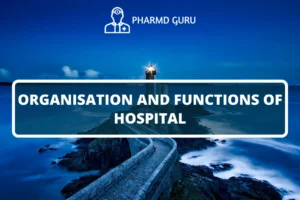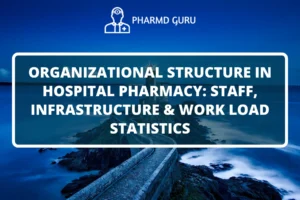PROFESSIONAL RELATIONS AND PRACTICES OF HOSPITAL PHARMACIST:
Hospital pharmacists play a crucial role in the healthcare system by ensuring the safe and effective use of medications and optimizing patient care. They work collaboratively with healthcare professionals to provide pharmaceutical expertise and support. This article explores the professional relations and practices of hospital pharmacists, highlighting their interdisciplinary interactions, responsibilities, and the importance of teamwork in delivering quality healthcare.
SCROLL DOWN TO THE BOTTOM OF THE PAGE FOR ACTUAL NOTES
TABLE OF CONTENTS:
- Introduction
- Interdisciplinary Collaboration
- Medication Review and Management
- Medication Safety and Error Prevention
- Drug Information Services
- Therapeutic Drug Monitoring
- Patient Counseling and Education
- Research and Quality Improvement
- Regulatory Compliance
- Continuing Education and Professional Development
1. Introduction
Hospital pharmacists are highly trained professionals who specialize in the field of medication management and patient care within a hospital setting. They work closely with physicians, nurses, and other healthcare professionals to ensure safe, effective, and appropriate medication use. By leveraging their knowledge and expertise, hospital pharmacists contribute to the overall quality and safety of healthcare delivery.
2. Interdisciplinary Collaboration
Effective interdisciplinary collaboration is vital for hospital pharmacists to provide optimal patient care. They work as integral members of healthcare teams, actively participating in rounds, meetings, and consultations. By collaborating with physicians, nurses, and other healthcare professionals, pharmacists contribute valuable insights regarding medication selection, dosing, and monitoring. This collaborative approach ensures a comprehensive and holistic approach to patient care.
3. Medication Review and Management
Hospital pharmacists conduct thorough medication reviews to ensure the appropriateness, safety, and efficacy of prescribed medications. They assess medication regimens, identify potential drug interactions, and recommend adjustments when necessary. Pharmacists also play a vital role in medication reconciliation during transitions of care, helping to prevent medication errors and adverse drug events.
4. Medication Safety and Error Prevention
Hospital pharmacists are key players in promoting medication safety and preventing errors. They employ various strategies, such as double-checking medication orders, participating in medication safety committees, and implementing barcode scanning systems. Pharmacists also contribute to the development and implementation of medication-related policies and protocols to enhance patient safety.
5. Drug Information Services
Hospital pharmacists provide valuable drug information services to healthcare professionals, patients, and their families. They stay up-to-date with the latest research and developments in pharmacotherapy, providing evidence-based recommendations and guidance. Pharmacists play a crucial role in answering drug-related queries, assisting with therapeutic decision-making, and promoting rational medication use.
6. Therapeutic Drug Monitoring
Therapeutic drug monitoring (TDM) is an essential practice conducted by hospital pharmacists to ensure optimal drug dosing and efficacy. By monitoring drug levels in the blood and interpreting the results, pharmacists can adjust medication doses to achieve therapeutic targets. TDM helps prevent drug toxicity and treatment failure, ensuring that patients receive the most appropriate and effective therapy.
7. Patient Counseling and Education
Hospital pharmacists are dedicated to patient-centered care and actively engage in patient counseling and education. They provide comprehensive information to patients regarding their medications, including proper usage, potential side effects, and precautions. Pharmacists empower patients to make informed decisions about their healthcare, promoting medication adherence and improved health outcomes.
8. Research and Quality Improvement
Hospital pharmacists contribute to research and quality improvement initiatives within the hospital setting. They participate in clinical trials, conduct medication-related research, and analyze data to identify opportunities for improvement. Pharmacists play an active role in implementing evidence-based practices, evaluating medication-related outcomes, and driving continuous quality improvement in patient care.
9. Regulatory Compliance
Hospital pharmacists ensure compliance with regulatory standards and guidelines related to medication management. They stay updated with legal requirements, such as controlled substance regulations, and collaborate with hospital administrators to develop and implement policies that promote medication safety and regulatory compliance. Pharmacists also participate in medication-related audits and inspections.
10. Continuing Education and Professional Development
Continuing education and professional development are paramount for hospital pharmacists to stay abreast of advances in pharmacotherapy and healthcare practices. They actively participate in workshops, conferences, and seminars to expand their knowledge and skills. Pharmacists also engage in professional organizations and pursue certifications to demonstrate their commitment to ongoing learning and excellence in practice.
ACTUAL NOTES




